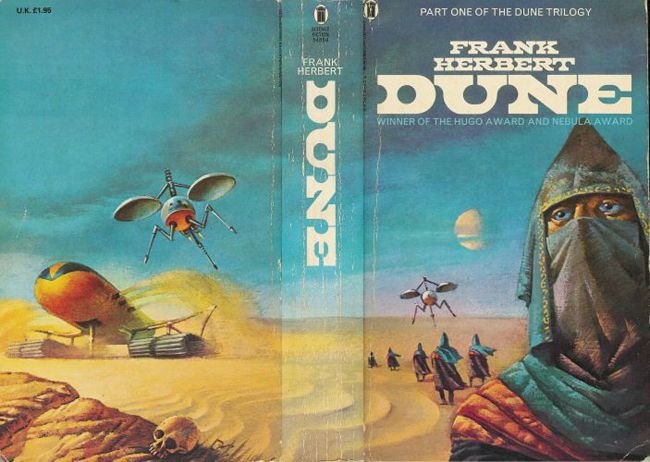Thoughts on Dune & its film adaption.

Dune is a book I have enjoyed reading, and re-reading, over the years. I have read the sequels written by Frank Herbert, but only once. Those I did not enjoy. I have not devled into any of subsequent novels. While the original has the feel of someone who used writing to process the experience of the drugs (magic mushrooms I believe) which helped spark some of the story’s ideas, the subsequent works felt like someone writing and imagining what it would be like to take drugs as an inspiration.
But back to the original. Well, to the films.
Firstly, while acknowledging there are many deeply flawed aspects to David Lynch’s 1984 adaption, I enjoyed watching it.
And now on to the main attraction. In 2021 Dune was again in the cinemas, this time with Denis Villeneuve as director. I thoroughly enjoyed the film. It was epic in an epic way. That’s not to say I didn’t have quibbles with some of the things left out, but when you’re taking a six-hundred page book onto the screen there have to be sacrifices made. By the end of the film I was excited to see part 2.
Which I did, on Friday night.
I’m not a massive fan of the cinema, or crowds, so I’d waited until a few weeks after release to book a viewing. I went with my son and we shelled out the extra money to watch at the IMAX screen in Plymouth. It was okay, but I’m not sure the £13.95 per ticket gave an experience double that of the £6.99 I’d have paid going to a standard screening at the city’s other cinema.
The film did a great thing by starting straight from where part one ended. There was no long intro or recap, just dumping you in media res. I rewatched part 1 on Wednesday, so it worked really well for me. Had I not then it would have taken me a few minutes to splice things together, but that’s a me issue and overall I like the effect of moving straight into the film without a recap..
As with part one the visuals are absolutely stunning. As with part one there were things which differed from the book and that was fine because, well, like we discussed earlier, it’s a 600 page book and while Alejandro Jodorowsky may have wanted to create a fourteen hour extravaganza, Villeneuve is more constrained by reality. Most of the changes were fine, even if I didn’t massively like them.
There was one change that, for me, made such a key change to the story that it irked me.
The time period of the second film is greatly truncated in comparison to the book. This means there is not the time to develop secondary and tertiary relationships and there’s a crucial gap in one relationship that doesn’t play out in full until the final scenes of the combined films.
In many ways Dune is a book about relationships. Most of these are the relationships Paul has. With his father, mother, mentors, and later the Fremen - notably Stilgar and Chani. But there are others. The Duke and Jessica; Shadout Mapes and Jessica; the Atreides and Harkonnens; The Space Guild and non-guild folks; the Bene Gesserit and humanity. One of the biggest relationships developed is between Jessica and Chani.
Like many mothers who have high hopes and set ideas for their sons, the relationship starts poorly, antagonistically. But it develops. By the end of the book, as Paul is setting the terms of negotiation for his marriage to the Emperor's daughter, Irulan, Jessica is in a position to provide Chani words of wisdom and comfort. The book reflects general gender roles of the period and seeing Chani’s character developed differently was fine, but removing the development of this key relationship, removing the calming, reassuring, words of Jessica in the final scene of the films completely destroys what is, in the book, a massively powerful final scene.
Instead of a moment of resolution, peace, and calm, we are left with a confused and emotionally distraught Chani fleeing and Paul - seemingly - about to marry the princess, just has his mother had wanted
For me, this was a fundamental break with the story. In the book Chani is such a powerful part of Paul’s future that he is explicit about what his relationship with Irulan will be. Like any partner would be, Chani is suspicious of her significant other deciding to marry a gorgeous, sophisticated, highly educated, princess. The film shows what for many would be a natural, or at least, realistic reaction to this. In the book the time spent developing Jessica and Chani’s relationship prevents this, and Jessica is able to reassure the woman who has become a friend, who is her son’s one true love. It just broke the entire ending scene of what had been a thoroughly enjoyable cinematic experience.
Talking about it in the car on the way home my son opined that he wasn’t worried about it but that was probably because he isn’t, and I quote, ‘quasi-obsessed with the book’.
I should have stopped the car and made him walk the rest of the way.
text by stuartcturnbull, picture of my edition of the book